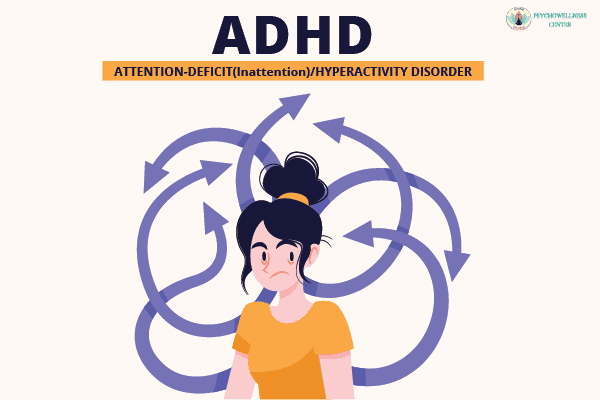Adolescence is a pivotal stage of development characterized by rapid physical, cognitive, and emotional changes. As young individuals navigate this transformative period, they encounter a myriad of challenges, from Academic pressures to social dynamics. Amidst these complexities, some adolescents grapple with difficulties in managing attention and controlling hyperactivity, which can significantly impact their daily lives. Understanding the nuances of inattention and hyperactivity in adolescence is crucial for parents, educators, and caregivers to provide the necessary support and guidance from the Best psychologist delhi for those affected.
Attention-Deficit/Hyperactivity Disorder (ADHD) lies at the core of these challenges, presenting persistent patterns of inattention, hyperactivity, and impulsivity that can disrupt academic performance, social interactions, and overall well-being. While it’s normal for adolescents to experience fluctuations in attention and activity levels due to developmental changes, individuals with ADHD face these symptoms to a degree that interferes with their functioning. By delving into the causes, manifestations, and strategies for managing inattention and hyperactivity in adolescents, we can foster a more inclusive and supportive environment for young individuals grappling with these challenges.
Understanding Inattention and Hyperactivity
Inattention and hyperactivity are core symptoms of Attention-Deficit/Hyperactivity Disorder (ADHD), a neurodevelopmental disorder that affects individuals of all ages. According to the Diagnostic and Statistical Manual of Mental Disorders (DSM-5), ADHD is characterized by persistent patterns of inattention, hyperactivity, and impulsivity that interfere with daily functioning and development.
Inattention refers to difficulty sustaining focus, being easily distracted, and frequently making careless mistakes. Hyperactivity involves excessive motor activity, such as fidgeting, restlessness, and difficulty staying seated. While some level of inattention and hyperactivity is common in adolescents due to their developmental stage, individuals with ADHD experience these symptoms to a degree that significantly impairs their functioning.
Causes of Inattention and Hyperactivity
Although the exact root cause of ADHD is unknown, evidence points to a potential combination of neurological, environmental, and hereditary factors. Genetic studies have identified several genes associated with ADHD, indicating a hereditary component. Environmental factors such as prenatal exposure to toxins, maternal smoking during pregnancy, and early childhood trauma may also increase the risk of developing ADHD.
Neurologically, ADHD is linked to differences in brain structure and function, particularly in regions responsible for attention, impulse control, and executive functioning. Neurotransmitter imbalances, particularly involving dopamine and norepinephrine, may also play a role in the manifestation of ADHD symptoms.
Supporting Adolescents with ADHD
Parents and educators play crucial roles in supporting adolescents with ADHD and helping them thrive despite their challenges. Here are some strategies that can be implemented:
1. Individualized Education Plans (IEPs): Work with school administrators to develop accommodations and modifications tailored to the adolescent’s needs, such as extended time on tests, preferential seating, or access to assistive technology.
2. Behavioral Interventions: Implement behavioral strategies, such as token economies, self-monitoring techniques, and positive reinforcement, to promote desirable behaviors and reduce impulsivity and hyperactivity.
3. Medication Management: Consult with a qualified healthcare professional, such as a pediatrician or psychiatrist, to explore pharmacological interventions, such as stimulant medications or non-stimulant alternatives, when appropriate.
4. Psychoeducation and Support: Provide adolescents with information about ADHD, its symptoms, and coping strategies to empower them to advocate for themselves and manage their condition effectively. Additionally, offer emotional support and connect them with peer support groups or Kid Therapy services.
Conclusion
In conclusion, navigating the challenges of inattention and hyperactivity in adolescents requires a multifaceted approach that involves understanding the underlying causes of ADHD, implementing evidence-based interventions, and providing comprehensive support systems. By addressing the unique needs of adolescents with ADHD through individualized education plans, behavioral interventions, medication management, and psychoeducation, parents and educators can empower these individuals to overcome obstacles and thrive academically, socially, and emotionally.
Additionally, in an increasingly digital age, access to Teen Therapy and resources can further supplement traditional interventions, providing adolescents with ADHD and their families with convenient and flexible support options. Seeking guidance from Therapists in delhi in India who specialize in ADHD can offer valuable insights and strategies tailored to the cultural context, ensuring that adolescents receive the comprehensive care they need to reach their full potential. Through collaborative efforts and holistic approaches, we can create environments that foster the success and well-being of adolescents with ADHD.
The Psychowellness Center has locations in NOIDA, Faridabad, Janakpuri, Dwarka, and Vasant Vihar, among other parts of Delhi NCR. With its wide presence, finding nearby mental health support is convenient.
At the Psychowellness Center, the combined contributions of Dr. (Prof) R K Suri, Clinical Psychologist, and Life Coach, and Ms. Nicole Fernandes, Counseling Psychologist, provide clients with comprehensive mental health guidance and care.
Reference:reference:
- American Psychiatric Association. (2013). Diagnostic and statistical manual of mental disorders (5th ed.). Arlington, VA: American Psychiatric Publishing.
- Cortese, S., & Aoki, Y. (2020). Editorial Perspective: ADHD as a Neurodevelopmental Disorder—Does Age Matter? Journal of Child Psychology and Psychiatry, 61(4), 337–339. https://doi.org/10.1111/jcpp.13175
- Faraone, S. V., & Larsson, H. (2019). Genetics of attention deficit hyperactivity disorder. Molecular Psychiatry, 24(4), 562–575. https://doi.org/10.1038/s41380-018-0070
- Langberg, J. M., & Becker, S. P. (2020). Does Long-Term Medication Use Improve the Academic Outcomes of Youth with ADHD? Journal of Attention Disorders, 24(6), 865–874. https://doi.org/10.1177/1087054717708792

